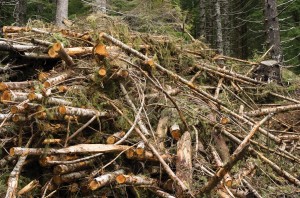 The Senate recently passed the bipartisan Energy Policy Modernization Act (S.2012) cosponsored by Senators Murkowski and Cantwell. One aspect of the bill that is creating controversy revolves around provisions characterizing biomass as a renewable, carbon-neutral energy source. This new, definitive characterization has sparked significant disagreement.
The Senate recently passed the bipartisan Energy Policy Modernization Act (S.2012) cosponsored by Senators Murkowski and Cantwell. One aspect of the bill that is creating controversy revolves around provisions characterizing biomass as a renewable, carbon-neutral energy source. This new, definitive characterization has sparked significant disagreement.
Proponents argue that the carbon emitted is part of a closed-loop system through which plant regrowth captures CO2 emissions. The Biomass Thermal Energy Council expressed its support of the carbon-neutral designation in the legislation, indicating that the bill puts “clean, highly efficient energy from biomass on a better footing to contribute to our country’s renewable energy and carbon reduction needs.” The bio energy industry believes the bill provides a newfound clarity for the role of biomass in the renewable energy realm by instructing the federal agencies primarily responsible for promulgating the country’s energy and environmental regulations to consider biomass as renewable.
Opponents of the carbon-neutral designation claim that the process, cradle-to-grave, generates CO2 emissions that are comparable to burning fossil fuels. Many representatives in the scientific and environmental communities are working to have these provisions removed in the House-Senate Conference on the bill. They assert that the time-lapse between burning trees and releasing carbon dioxide today, versus the decades it takes to grow new ones, supports the argument that forest biomass is not carbon-neutral. The New York Times, a coalition of scientists and a number of environmental organizations expressed opposition to the bill as a whole, mainly due to the proposed biomass, carbon-neutral provisions.
Part of this discussion should include the impacts of biomass on water consumption. Specifically, corn grown for ethanol is probably the largest consumer of water per BTU of liquid fuel.… Read more »
This debate, like many others roiling the present administration, is not one of contrary interpretations of facts, it is one of hard scientific evidence versus counterfactual ideological beliefs. In this… Read more »
Ike, your post is spot on. If you haven’t already read it, I highly recommend a book by the recently departed David MacKay called Sustainable Energy Without the Hot Air.… Read more »
Biomass is one of the most important renewable energy options for many fronts. By biomass, I mean biodegradable resource, not MSW. Intercepting biomass – manures, rotting foodstuffs and canning &… Read more »
This is a nuanced subject and the designation of biomass as carbon neutral is closer to being accurate than either of the first two responses here. Everything is carbon neutral… Read more »
Corn ethanol is already capped, so that issue is a red herring unless the caps are removed. Biomass has a deserved place at the table for our energy mix, though… Read more »
More than anything I might write on the topic in this confined space, this series of articles on the topic of biomass and its classification as carbon-neutral dissects the subject… Read more »
I took a peek at your link. Its pros style is not a deep dive into facts. From what I can gather it is based on modeling and modeling is… Read more »
I share Scott Sklar and Bill Brandon’s perspective. Also, although the legislation mentioned focuses on forest resources, the discussion about carbon neutrality does bleed over into assessment of all regenerative… Read more »
The debate over the carbon impact of biomass for energy has persisted due to a fallacy of logic, repeated above by Capt. Kiefer. It should be plainly understood that… Read more »
The original question posed is whether biomass should get a blanket pass via legislative fiat as being carbon neutral, or whether we should actually perform the due diligence analysis to… Read more »
Bioenergy from forest biomass is deemed carbon neutral because the carbon exchange has already been counted as a reduction in carbon sinks, per IPCC guidelines. EPA is the only… Read more »
The fundamental problem that these laws are trying to solve is that fossil fuel companies are currently allowed to pollute the atmosphere for free and we are beginning to understand… Read more »
This has been a pretty rich discussion, but I would like to add a few points. 1) Not all biomass is created equal. How the biomass is raised, harvested, collected,… Read more »
[…] Original Post […]